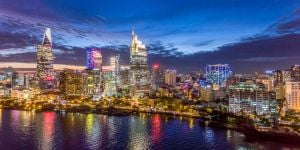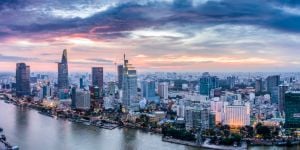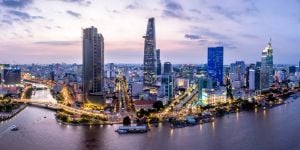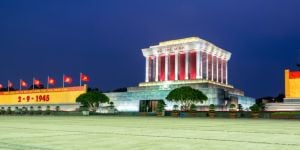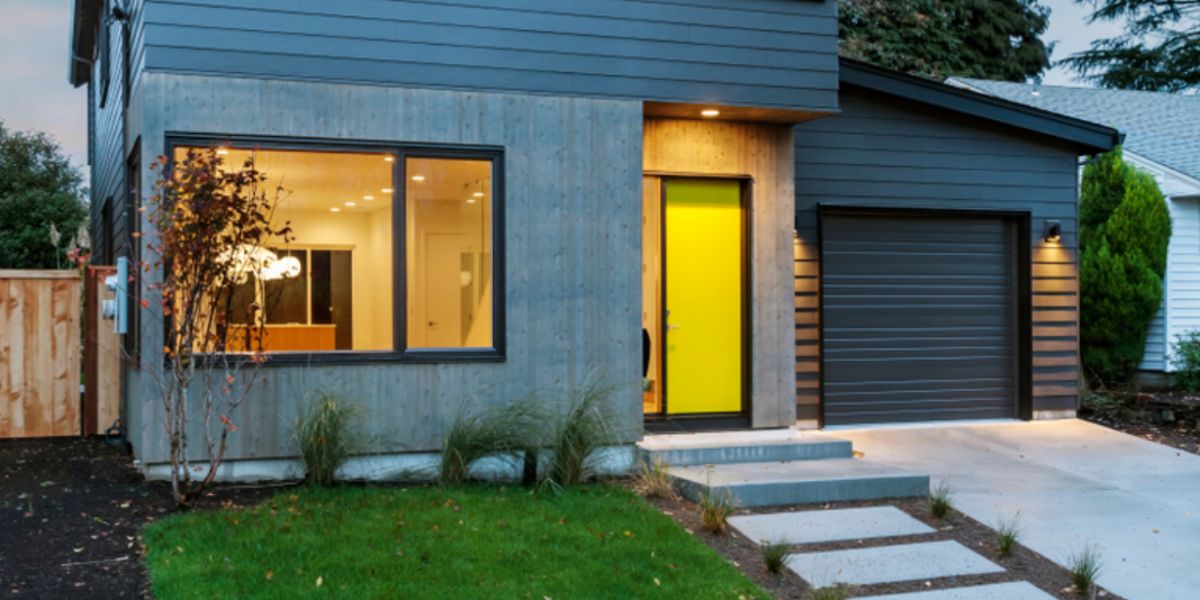
As Vietnam's economic boom grows, you might be sitting on the sidelines wondering how to invest and put down financial roots in this beautiful country. Vietnam continues to welcome foreign investors, and as more companies open locations nationwide, we understand the appeal of becoming a property shareholder. If you're interested in becoming a homeowner in Ho Chi Minh City, we've compiled essential information about the property market and acquisition procedures.
The Vietnamese property market
Buying property in Vietnam as a foreigner is still a relatively new concept, as it didn't become legal until 2015. Unfortunately, like most administrative tasks in Vietnam, the process is long with endless paperwork and will not be wrapped up quickly or efficiently.
Good to know:
Property is only for purchase if you are married to a Vietnamese citizen or have secured a Residence Card through investment or professional gains.
As areas continue to experience learning curves, the most important thing you can do is research and connect with the landowner to understand the vision.
An overview of the real estate market in Ho Chi Minh City
The HCMC real estate market offers diverse opportunities for investors, with various districts catering to different lifestyles and preferences.
The demand for apartments has decreased, with the number of apartments sold dropping by 4% year-on-year to 1,915 units in Q3 2024. The supply of new landed houses in Q1 2024 was limited, with no new supply for sale.
Ho Chi Minh City has unveiled its new metro line, which is thought to attract new foreign investors and kick-start paused construction projects. It is also in talks to continue developing the metro and make it a hub for IT and green energy by 2030.
While expats are allowed to purchase property in Ho Chi Minh City, they are not allowed to own the land that it sits upon. Therefore, expats are only allowed to buy new and off-plan projects. The biggest listing companies in Ho Chi Minh City are Savills, Colliers, Visiup, Batdongsan, VIProperty and Tranio. Hiring a real estate agent through one of those mentioned above will make the process run a lot more smoothly.
Procedures for buying property in HCMC
Luckily for those interested, expats are now able to purchase multiple properties even on a tourist visa, thanks to the Vietnamese Law on Residential Housing (LRH). One way to go about this is by setting up a foreign-owned company. The next step is to register the company and obtain an Investment Registration License from the Department of Planning and Investment (DPI) - this will help expats to legally buy and sell in Vietnam.
Confirmation of this certificate generally takes about 4-6 weeks. Once that is complete, it's necessary to incorporate the foreign business through the DPI and acquire a Business Registration Certificate, which is estimated to take about 90 days. This option is ideal for people who are looking to let the property to renters or future buyers.
Keep in mind that if you want to secure funding from a domestic bank, you will not be eligible to open an account on a tourist visa. You should have a trusted Vietnamese business partner to help you assess documents, handle funding from financial institutions, and also discuss legality with local enforcement.
One of the most important things this Vietnamese business partner will assist with is expediting the pink book. This document is the key to:
- Allow you to utilize your house for residential and any other purposes;
- Enable you to dismantle, maintain, renovate, or rebuild your house (but you must obey the conditions and procedures of the laws on construction);
- Let you lease/sell/mortgage the house or give it to an heir.
Most importantly, you need this book to secure bank loans, as this will represent your property or collateral.
Expats who aren't interested in business ventures and would prefer to invest in or buy property individually may also take that route. So long as the expat is a resident of Vietnam, they will be able to purchase property for up to 50 years; this can be extended.
Good to know:
By law, individual buyers are not legally able to rent out their property.
Foreigners are subject to the following ownership limitations:
- Condominiums (apartments): Foreigners can own up to 30% of the total number of units in a condominium building.
- Landed property (villas, houses): Foreigners can own up to 10% of the properties in a landed property development or a maximum of 250 landed properties within a ward.
The price of property in Ho Chi Minh City
Investing in real estate is an interesting decision in the emerging Vietnamese market. With a growing middle class, there is a higher push to own studios, two-bedroom or penthouse modern style apartments - but as an expat, what will that cost you?
For all apartments listed belo,w the building would be designed with high-end amenities including a pool, gym, balcony, and in-house washing machine. As a perk to living in Vietnam, buildings will have cleaning services, or you can also hire a family helper to assist.
Studio apartments range from $2-3,000 USD per m² (52-78 million VND) or an estimated total price of $60-135,000 (156-351 million VND).
A one-bedroom apartment is currently on the market for the average price of $250,000 USD (6,500,263,965 VND).
A two bedroom apartment to purchase as per the market is $2,5-4,500 USD per m² (65- 117,004,500 VND) or an estimated purchasing price of $175,000-450,000 (4 - 117 billion VND).
Penthouse apartments will offer you a spacious investment with room for family and friends to visit. These are currently on the market, ranging from $4-6,000 USD per m² (104-156 million VND) or will run you over a million USD (26 billion VND) to purchase.
When it comes to purchasing an apartment, you will also need to be aware of the following fees:
- VAT (10%);
- Registration (.5% of property value);
- Maintenance (2% of property price - one-time fee);
- Notary ( depending on services used and normally .5-1% of property value);
- Legal (depending on situation);
- Annual land tax ( recurring .03-.15% of land value).
While these are all extra fees, you may also have specific building fees or taxes depending on the property you are investing in.
The best district to buy property in Ho Chi Minh City
As a foreigner buying property in Vietnam, you need to pinpoint what you want the property for to decide on the best district in which to place your investment.
If you invest in a foreigner-focused district (District 2,7), your business partners will be familiar with handling business with foreigners and may be more flexible towards your needs or concerns. If you are investing with family or a spouse in a traditionally more Vietnamese neighborhood, your voice may not be heard as loudly during business discussions.
Here are a few key points we'd like to highlight per district as a recommendation for investing in property in Ho Chi Minh City:
District 1
District 1 consistently offers some of the highest rental yields in Ho Chi Minh City due to its central location and demand from both locals and expats.
Properties in District 1 have shown strong capital appreciation over the years, making it a solid investment for long-term gains.
As the economic and commercial center of the city, District 1 attracts businesses and professionals, ensuring a steady demand for rental properties.
District 2
Thao Dien is a popular area for expats, leading to high rental demand and stable rental income. You'll be close to several international schools, which may also attract long-term renters like families or land developers.
This is one area that never ceases to grow and evolve. Whether it's a new restaurant or another new international school, District 2 is poised for significant growth and property value appreciation. You will have better luck networking and working with land developers in this area, as they are the most familiar with foreign business partners.
Thu Duc City
Thu Duc City is undergoing rapid development with a focus on education, technology, and innovation, attracting young professionals and investors.
The presence of several universities and research institutes ensures a steady demand for rental properties from students and faculty, and aligns with the infrastructure development due to increased focus on IT and green energy.
Ongoing and planned infrastructure projects are expected to enhance connectivity and drive property value appreciation in the area.
What is Vietnam's New Land Framework?
Announced in October 2024, the New Land Framework is meant to provide more transparency for everyone entering into land valuation. This is important information for a foreigner to understand because even though you don't own the land your property is on, this framework may dictate the speed at which the property is built or alert you about changing costs.
According to well-trusted property developer Savills Vietnam, this is what you should know about the New Land Framework and why it should matter to you:
The new land price framework is a positive step towards aligning land prices with market values, but it must be implemented carefully to balance the interests of all stakeholders and ensure sustainable growth.
- The new land price framework aims to enhance transparency and align land prices with actual market values. This adjustment is expected to improve land valuation and transactions, particularly for infrastructure projects.
- This framework is in place until December 2025 and will be receiving public feedback. This is important as it highlights the constantly changing market of Ho Chi Minh City.
- A key concern is increased project development costs, which could raise real estate prices, especially in the mid-range and affordable housing segments. This may reduce market competitiveness.
Useful links:
We do our best to provide accurate and up to date information. However, if you have noticed any inaccuracies in this article, please let us know in the comments section below.
